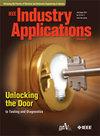A Comprehensive Characterization of Hollow Conductor Additively Manufactured Coils and Thermal Management System for a 250 kW SPM Machine
IF 4.2
2区 工程技术
Q2 ENGINEERING, ELECTRICAL & ELECTRONIC
引用次数: 0
Abstract
This paper presents a comprehensive study on thermal management system and behavior of additively manufactured coils through heat pipe based liquid cooling thermal management system, for a 250 kW and 5,000 rpm surface permanent magnet machine. Heat pipes and liquid cooling test setups are described and discussed. The thermal discussion is concluded by experimental results showing the effectiveness of the thermal management system proposed in this paper. Single and dual condenser liquid cooled configurations are tested under current levels ranging from 80 Arms to 140 Arms and up to 800 Hz. Comparison between these cooling systems shows the effectiveness of both configurations for AlSi10Mg additively manufactured coils. For the proposed system, the heat load does not exceed the capabilities of either of the cooling methods and therefore the performances are similar. FEA is performed using ANSYS Maxwell to model the losses at various frequencies and current levels. The FEA results match the experimental findings with a maximum error of 5.9%. Finally, the FEA results are used to predict experimental losses for the coils at the rated conditions of 1250 Hz and 268 Arms which are beyond the experimental setup limits.求助全文
约1分钟内获得全文
求助全文
来源期刊

IEEE Transactions on Industry Applications
工程技术-工程:电子与电气
CiteScore
9.90
自引率
9.10%
发文量
747
审稿时长
3.3 months
期刊介绍:
The scope of the IEEE Transactions on Industry Applications includes all scope items of the IEEE Industry Applications Society, that is, the advancement of the theory and practice of electrical and electronic engineering in the development, design, manufacture, and application of electrical systems, apparatus, devices, and controls to the processes and equipment of industry and commerce; the promotion of safe, reliable, and economic installations; industry leadership in energy conservation and environmental, health, and safety issues; the creation of voluntary engineering standards and recommended practices; and the professional development of its membership.
 求助内容:
求助内容: 应助结果提醒方式:
应助结果提醒方式:


